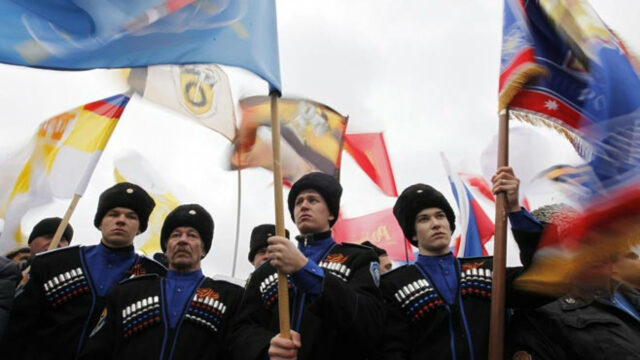
De-Cossackization as a Key Part of Moscow’s Russification Agenda
Publication: Eurasia Daily Monitor Volume: 20 Issue: 40
By:

Part of Russia’s imperial tactics for delegitimizing national minorities within its empire has been the theft or commandeering of indigenous cultures and their re-articulation into a form that supports Moscow’s power arrangements. This is proving to be the case with the seeming revival of the Bolshevik policy of “de-Cossackization” within today’s Russia. The 1919 policy, remembered as a deliberate extermination by the ethnic Cossack communities of southern Russia, stated that “it is necessary, taking into account … the civil war with the Cossacks, to recognize that the only correct most merciless struggle with the Cossacks is their total extermination. No compromises, no half-heartedness on this path is acceptable.” The policy laid out eight recommendations, including carrying out “mass terror against rich Cossacks,” “confiscating bread and forcing all the surplus to be poured into the specified points” and “carrying out complete disarmament by shooting everyone found in possession of a weapon” (Allcossacks.ru, January 24). Although this order was rescinded by the Soviet Central Committee just 52 days later, it was still enough time to permit the physical extermination of many Cossacks. It is remembered as being the trigger for the “rebirth” of the ethnic (or “free”) Cossack movement throughout the country. Yet, the Kremlin has seemingly attempted to commandeer such commemorative narratives.
In many ways, efforts to appropriate the Cossack day of commemoration seem reminiscent of earlier Russian Empire and Soviet attempts to undermine Ukrainian identity. When asked to compare Russian and Ukrainian Cossack groups, many Ukrainian subjects characterized the Russian Cossacks to this author (who is currently conducting research with Ukrainian refugees in Poland) as being formed in imitation of the authentic Cossack hosts centered in Zaporizhzhia and the island of Khortytsia (Author’s interviews, December 2022). It was Catherine the Great who razed the Cossack sich (fortress) and relocated the Zaporizhzhia host to present-day Krasnodar, where a strong Cossack identity still exists (Arnold, “Testing Constructivism: Why Not More ‘Cossacks’ in Krasnodar?’” Post-Soviet Affairs, 2014). By appropriating the culture of indigenous peoples and re-articulating it in a way that supports the state, both the Russian Empire and Soviet government sought to defang any threat to territorial integrity.
This can be seen again today in Russia’s state-organized (“registered”) Cossack movement, which traditionally holds its own services remembering this event. These Cossack do not expect direct descent from ethnic Cossacks as a criterion of membership and instead virtually accept anyone as a “Cossack” if they simply perform services for the Russian state, such as patrolling streets and working as border protection forces. While they might be sympathetic to the memories of de-Cossackization, the vast majority have no biographical or authentic link to that history.
On January 24, “in the military churches of the Cossack societies of the Kuban, Don, Terek, Volga regions, and the Far East … requiem services were held for Cossacks and Cossack victims. In Moscow … the divine service was led by Metropolitan Kirill of Stavropol and Nevinnomysk, chairman of the Synodal Committee for Interaction with the Cossacks.” To complete the picture, Metropolitan Kirill added, “On this day, memory lessons dedicated to the tragic date were held in Cossack classes and Cossack cadet corps” (Vsko.ru, January 25). Aside from describing past Soviet policies as “tragic,” Kirill further criticized the previous authorities in saying “things were only good for Russia … when the churches were full of believers.” In this way, Kirill creates a distinction between the current Russian regime and its forebears, which reinforces the Russian Federation’s position as heir of the Russian Empire and deflects minority grievances to an imagined past. It also reflects Russia’s imperial governmentality—just as ethnic minorities were Russified in that empire to preempt threats to integrity, so too are they being Russified today. The implication that Russia is trying to solve its ethnic problems through tired methods suggests a lack of imagination from a regime in Moscow that is stuck in the past (see EDM, February 14).
Metropolitan Kirill tacitly acknowledged such when he declared, “Preserving this memory is important not to incite hatred against anyone or look for someone to blame. Looking to the past, we do not call for hatred of the ideological inspirers and executors of such a terrible decision, but, on the contrary, we try to find the strength in ourselves and say in the words of our Lord Jesus Christ: ‘Father, forgive them, for they know not what they do’” (Vsko.ru, January 24). Thus, the Russian government is aware that the issue of Soviet treatment of minorities could be a “wedge” issue that foreign adversaries might use to promote discord inside Russia (see EDM, January 18). This seems to be a possible slip by the Russian Orthodox metropolitan as an unintentional reveal of Moscow’s true concerns. But it is one that the Kremlin is trying to resolve with methods from another century, certainly not taking the vastly expanded information space into account. This permits those discontented with approaches such as cultural appropriation to coordinate at a higher level, which makes the consideration of traditional imperialist strategies unwise.
Since the fall of the Soviet Union, Russian Cossacks have tried to position themselves as the original Cossacks rather than the Ukrainian Cossacks, and not as the copy. Similarly, the Cossack identity is a major ideological support for Ukrainian troops on the front lines, who frequently call each other “Cossack” and even sport Cossack haircuts or tattoos. By following the imperial strategy of commandeering the memory politics of its indigenous peoples and exploiting them for its own ends, the Russian government seems to have learned little from history and is indeed risking further Ukraine-like scenarios in its own territory as such groups come to resist the Kremlin’s attempts at cultural appropriation.



